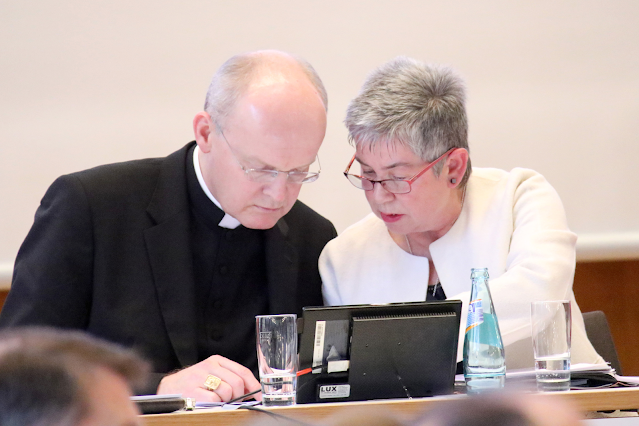How the Church instrumentalises people's fear of the (extreme) right. Progressive hardliners are most hardline of all.
How the Church instrumentalises people's fear of the AfD
Catholic officials like Essen's Bishop Overbeck warn that "religious-reactionary movements" in the Church have links to right-wing political circles. This is a logic of exclusion: in the end, every believer can be put under suspicion who is not on the reform line.
One of the many large and small unsavourinesses associated with the rise of the far-right AfD, which threatens the constitution, is the temptation to instrumentalise the all too justified concerns of many people about this rise for one's own agenda. The officials of the Catholic Church in Germany are currently demonstrating how this can be done, albeit in their own clumsiness.
On Monday, the president of the Central Committee of German Catholics (ZdK), Irme Stetter-Karp, warned that the "overlaps" between the positions of the AfD and a "conservative Catholic clientele" within the church "unfortunately cannot be overlooked". She therefore considers it "a blatant political mistake that the Vatican also does not accept democratic core principles for the clarification of inner-church questions, and has even repeatedly rejected them, thus indirectly devaluing democracy".
A statement whose shaky logic could at least be excused by possible personal grievance: The Vatican distinguishes itself above all by not granting Irme Stetter-Karp the audience she so bitterly requested, i.e. simply not counting her as an interlocutor.
But now, just one day later, Bishop Franz-Josef Overbeck of Essen, a heavyweight within the German Bishops' Conference and part of the reform wing, has also taken up the pattern of thought: There are "religious-reactionary movements" within Catholicism that are "indeed the religious equivalent of the new political right", "with not infrequently direct links". "I am doing everything in my power to work towards keeping these tendencies in our Church as small as possible."
So the argumentation is: all those in the church who are too traditionally minded are as bad as the AfD or quite the same in general. The trick here is that the alliterations "conservative Catholic" and "religious reactionary" are summarily equated with "AfD proximity", but Stetter-Karp and Overbeck leave open what is to be understood by them in the first place.
Does it mean a few scurrilous apostates who think Pope Francis is illegitimate, or is it enough to affirm Mary's bodily assumption into heaven, to defend celibacy or to find the Synodal Path unfortunate?
According to the Overbeck-Stetter-Karp doctrine, ultimately every believer can come under suspicion of extremism who does not enthusiastically enough support the reform wishes of the ZdK establishment - whether he votes right, green or not at all. A reform Catholicism that uses such strategies of exclusion is also just another form of hardline action.










.jpeg)

Comments